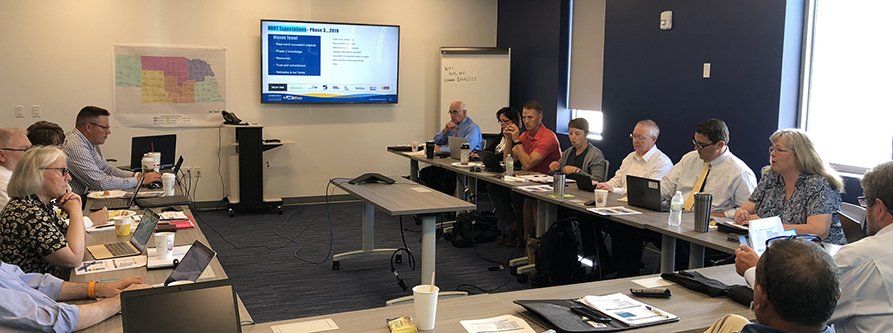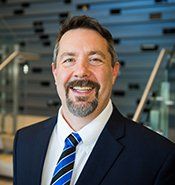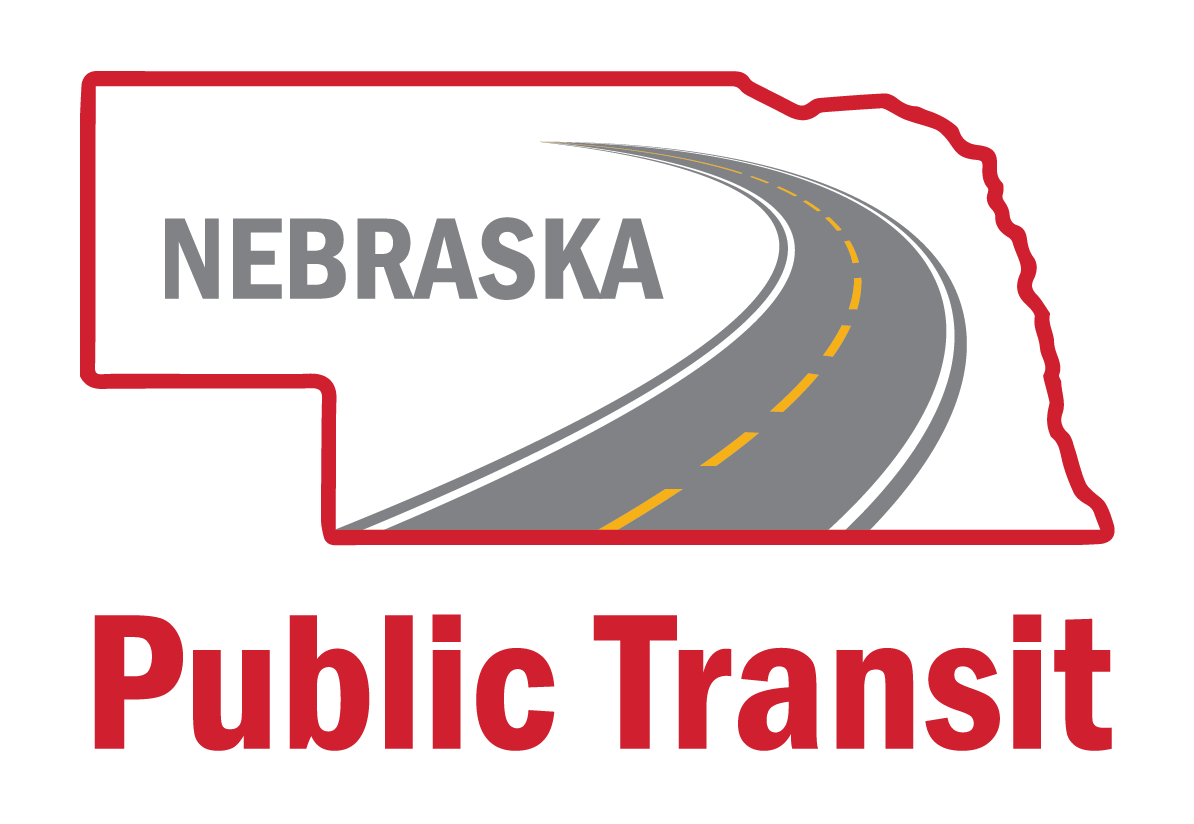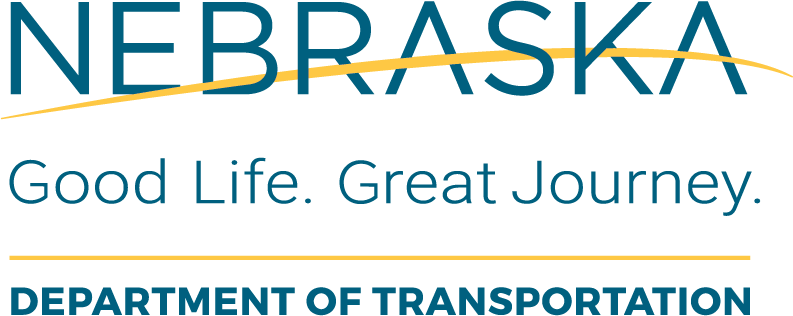ACTIVE PROJECTS

In 2023 the state's organization into six regions was updated.
Project Goals
- Ensure successful outcomes for each of the priority NDOT projects.
- Engage key community stakeholders for realistic sustainable projects/services.
- Provide continuous oversight and management of the priority projects. Olsson will provide overall direction and coordination to team members, monitoring work progress, communication, staffing, and technical work throughout the duration of the entire project.
Priority NDOT Projects
-
Grand Island/Kearney/Hastings Intercity Bus Study
Deliverables
Project Goal
Conduct the Grand Island intercity bus operational analysis, identify park and ride locations, determine sustainability, and develop a marketing plan. Deliver a plan to NDOT and the communities with these elements.
Project Description
The local project team will review previous studies completed for the tri-city area, in addition to current travel patterns among Grand Island, Kearney, and Hastings. A Technical Committee will be developed and assist in developing realistic goals and objectives for the service, for both the short-term and long-term. They will review and discuss project needs, gaps, and strategies for proposed transit routes between the three cities. The local project team will conduct multiple stakeholder interviews to ensure input from each of the communities is considered for the final transit routes.
The FTA 5311 (f) policies and regulations will be thoroughly reviewed to understand and maximize funding resources for the future transit service. The local project team will provide community overview, including socioeconomic and demographic data, major activity centers, travel flow and patterns, and an inventory of existing services and providers. Service alternatives will be developed, which include route alternatives, service characteristics, operating and capital costs. The advantages and disadvantages for each option will be compared, with a recommended preferred alternative.
Project Updates
- September 2022 — This project is awaiting funding to begin implementation. The Mobility Management team is actively coordinating with NDOT on aligning funding.
- February 2021 — The Mobility Management team published the final report in June 2020. The report outlined the Preferred Alternative chosen by the communities based on information pulled by the team. The Alternative consists of flexible, fixed-route service operating between Grand Island, Hastings, and Kearney with flexible routes traveling within each community. It will reach landmarks and services identified by the community as important and essential. With the report published, the Mobility Management team’s next step is to strategize implementation processes.
- June 2020 — Due to the COVID-19 pandemic, the third round of meetings were held via digital conferencing. The final report is being completed and will be ready in July 2020.
- December 2019 — The project team has hosted multiple public engagement meetings in town. There we have found great support within the tri cities for a service connecting the communities. The third round of public engagement has been scheduled for late March, after which the technical committee is ready to begin finalizing the proposal for presentation to NDOT and the communities.
Prior Public Meetings
Public Input Round One
- Monday, September 23 - Grand Island
- Tuesday, September 24 - Hastings
- Wednesday, September 25 - Kearney
- Meeting Handout
- Meeting Presentation
Public Input Round Two
- Wednesday, December 4, 2019 - Kearney recorded presentation
- Thursday, December 5, 2019 - Hastings recorded presentation
- Friday, December 6, 2019 - Grand Island recorded presentation
- Meeting Handout
- Meeting Presentation
-
Lincoln/Omaha Intercity Feasibility Study
Deliverables
- Lincoln/Omaha Intercity Feasibility Study Executive Summary
- Lincoln/Omaha Intercity Feasibility Study Final Report
- Intercity Bus Report Update 2022
Project Goal
Conduct a feasibility study to deliver a future Lincoln to Omaha intercity bus route based on the Colorado Bustang model. Determine investment needed to launch similar service including capital investment and long-term sustainability.
Project Description
The local project team will review previous studies completed for transit options between Lincoln and Omaha. A Technical Committee will be developed and assist in developing realistic goals and objectives for the service, for both the short-term and long-term. The local team will review and discuss project needs, gaps, and strategies for proposed transit routes between the two cities. The local project team will conduct multiple stakeholder interviews to ensure input from Omaha, Lincoln, and the smaller communities is considered for the final transit routes.
The FTA 5311 (f) policies and regulations will be thoroughly reviewed to understand and maximize funding resources for the future transit service. The local project team will provide community overview, including socioeconomic and demographic data, major activity centers, travel flow and patterns, and an inventory of existing services and providers. Service alternatives will be developed, which include route alternatives, service characteristics, operating and capital costs. The advantages and disadvantages for each option will be compared, with a recommended preferred alternative.
Project Updates
- September 2022 — This project is awaiting funding to begin implementation. The Mobility Management team is actively coordinating with NDOT on aligning funding.
- February 2021 — The Mobility Management team published the final report in June 2020, concluding that a bus route between Lincoln and Omaha is realistic. The Preferred Alternative defined within details two routes running between the cities designed for end user accommodation as well as a third route to serve the rural communities along Highway 6. With the current COVID-19 pandemic, the next step (securing funding) will be on hold to direct resources for aid.
- June 2020 — The public input phase concluded in February. The final report will be ready in July 2020.
Prior Public Meetings
Public Input Round One
- Wednesday, September 4, 2019 - Greenwood
- Thursday, September 5, 2019 - Lincoln
- Friday, September 6, 2019 - Omaha
- Meeting Handout
- Meeting Handout (Spanish)
- Meeting Handout (Vietnamese)
- Meeting Presentation
Public Input Round Two
- Wednesday, November 13, 2019 - Lincoln recorded presentation
- Thursday, November 14, 2019 - Ashland recorded presentation
- Friday, November 15, 2019 - Omaha recorded presentation
- Meeting Handout
- Meeting Presentation
Public Input Round Three
- Tuesday, February 25, 2020 - Lincoln
- Wednesday, February 26, 2020 - Omaha
- Thursday, February 27, 2020 - Ashland
- Meeting Handout
- Meeting Presentation
- Recorded Presentation
-
Norfolk Flexroute Feasibility Study
Deliverables
Videos
- Watch the new name reveal that took place Wednesday, September 8, 2021 at 10 A.M. and learn more about North Fork Area Transit's exciting new services.
- New public transit services are coming to Norfolk and the region. Learn how North Fork Area Transit is growing to serve you.
Project Goal
Initiate and complete the Norfolk flexroute service feasibility study.
Project Description
Should the community support the decision to move forward with a flexible route service, a follow-up report with the next steps of work will be completed, including a bus stop assessment, environmental approval, marketing, public involvement, and plans for operations, capital, staffing, marketing, and assist in implementation of service roll out.
Previous strategies identified for the Norfolk Public Transportation will be revisited and updated, as needed to reflect today’s community vision for transit. A Technical Committee will be developed and will assist in developing realistic goals and objectives for transit in Norfolk, for both the short-term and long-term. The project team will complete site visits at the two existing agencies in Norfolk – the Ponca Express and the Norfolk Public Transportation.
The local team will review and discuss project needs, gaps, and strategies for enhanced public transportation within the city of Norfolk. Different types of service will be reviewed, and the Technical Committee will ultimately decide the best transit service for Norfolk. The local project team will conduct multiple stakeholder interviews to ensure input from the community, residents, visitors, elected officials, etc. is included in the analysis.
Project Updates
- September 2022 — In early 2022, Norfolk Public Transit rebranded to North Fork Area Transit. Following the implementation plan from the feasibility study, in April 2022, the new host of services offered by North Fork Area Transit include a scheduled flexroute with two routes called ForkLift and a 24 hour in advance demand response ride called TeleLift. Over the summer, the organization added regional routes extending south and west as well as a popular service called NiteLift, offering a late-night ride to Norfolk residents. The services are expected to expand and continue to serve the needs of the city of Norfolk as well as the surrounding areas.
- February 2021 — The Mobility Management team published the Norfolk Flexroute Study in November 2020. The final report presented a plan to meet the existing gaps in Norfolk and the surrounding area. The study provides guidance and direction to the transit agencies about how to address current and future transit needs with detailed service recommendations. NDOT, City of Norfolk, Ponca Tribe, and the Mobility Management team are working on the implementation plan.
- June 2020 — The final report will be completed in July 2020.
- December 2019 — The team has identified three options for the technical committee to review and make changes. The routes cover the Norfolk core with stops at schools, shopping, and medical facilities. In addition, the committee is reviewing the best and most efficient use of both Ponca Express and Norfolk Public Transit’s resources for this expansion in transportation for the Norfolk community. Aside from the proposed flex route, the expansion offers the continuation of the demand response service and increased regional connectivity.
-
Northeast Region Mobility Management/Coordination
Deliverables
- Northeast Region Transit Agency Quick Reference Guide (Updated August 2023)
Project Goals
- Facilitate transit coordination in the Northeast Region by connecting with existing providers including Ponca Express, intercity bus providers, Norfolk Public Transportation, Avera St. Anthony's Hospital in O’Neill, Knox County (Ponca Express and Avera Creighton Hospital) and Cedar County Transit.
- Implement regional transportation and coordination activities using previously identified strategies and opportunities.
- Arrange and facilitate in-person stakeholder meetings, regional coordination meetings, statewide coordination meetings, and public meetings.
- Schedule, attend, and facilitate annual meetings in Northeast region. Meeting will be accessible via internet and recorded.
Project Description
The local project team will review Mobility Management Phase 2 completed tasks for Northeast Region. In addition, regional committee members will discuss transportation gaps, needs, and strategies to increase coordination. Follow-up meetings with agency partners will include discussions of realistic steps for implementing projects to meet regional needs. Quarterly Regional Coordinating Committee meetings will be held in the region to facilitate partnerships and planning.
Project Updates
- September 2022 — Quarterly meetings were continued each year. In late 2021, Cedar County Transit won the National RTAP grant to provide a pilot of expanded services into neighboring Knox County for a year. CCT experienced large growth throughout 2021 with much success from residents of Knox County. As the year of grant funding winds down, CCT is working on sustained funding.
- February 2021 — Quarterly meetings were held online due to the pandemic with increased turn out from the 5310 agencies. Agencies were able to discuss changes caused by the pandemic and best practices as well as examine the development of new scheduled routes within the region. The Northeast Region celebrated new facilities and buses. With increased connection between agencies, coordination will continue.
- June 2020 — The Quarter 1 meeting with transit managers in the region was held via digital conferencing. The Coordination Committee is developing goals for the 2020 calendar year and will discuss these goals at the Quarter 2 meeting in July 2020. The team continues to draft provider profiles based on demographic and agency data.
- March 2020 — The Northeast Region Transit Agency Quick Reference Guide has been completed.
- December 2019 — The Coordination Committee is in the process of updating the contact list for all transit providers in the Northeast region. With this, the committee can continue outreach bringing all providers to the table to offer the most effective and efficient coordination. The project team is working to identify needs and overlap between all services offered.
Committee Meetings
2019 Quarter 3 Meeting - Thursday, August 8, 2019
2019 Quarter 4 Meeting - Thursday, December 12, 2019
2020 Quarter 1 Meeting - Tuesday, March 17, 2020
2020 Quarter 2 Meeting - Thursday, July 23, 2020
-
Statewide Mobility Manager
Project Goals
- Provide statewide mobility management services to include coordination, marketing, trip planning, and travel training.
- Participate in the assessment of the need for mobility managers in each of the 6 identified regions.
- Facilitate coordination among the 6 Coordination Regions across the state.
Project Description
Statewide Mobility Manager William (Bill) Bivin leads and assists with mobility management projects across the state. The Mobility Manager will review strategies from each region, update as appropriate, and make a plan for implementation that works for each region.
Project Updates
September 2022 — Nebraska continues its work to enable and provide public transit agencies with the digital tools increasingly necessary for managing public transit. Nebraska now has 22 rural agencies using scheduling and dispatching software. This provides both immediate and long-term efficiencies in public transit and enables future statewide trip planning. Some of the current projects and activities include the following:
- Statewide trip planning
- KCTS expansion
- North Fork Area Transit facility and expansion
- Hastings transportation study
- Cedar County Transit National RTAP grant
- Lancaster County Health Equity Coalition
- Nebraska Olmstead Transportation workgroup
- Nebraska Association of Transportation Providers Board
- Nebraska Safety Center Advisory Board
- Grand Island transit development plan
- Intercity bus planning
February 2021 — Over the past year, the Mobility Manager has been a huge resource for agencies and those in need of transit. With the backing of the NDOT, the Mobility Manager helped implement software for 16 agencies. Additionally, the Manager has become increasingly involved with groups and organizations at both the state and regional level including:
- MO Rides
- CTAA
- National RTAP
- National Center for Mobility Management
- Colorado DOT: “Connected Colorado”
- StarTran Advisory Board
- FTA Region 7 Office
- Nebraska Department of Economic Development
- NACO Leadership Institute
- Council on Public Transportation and Multi-State Transit Technical Assistance Program (MTAP)
- AASHTO
-
Technology Project
Deliverables
Video
- Learn how transit software is making public transit in rural areas more efficient, easier, and faster.
Project Goals
- Develop the short-range and long-range technology vision for NDOT Transit Division.
- Write RFPs or RFQs as needed to facilitate project implementation.
- Provide opportunities for recent technology information sharing.
Project Description
The local project team will review technology projects from Phase 2 and build from efforts completed to meet the Transit Division technology vision and goals. An inventory of existing software/hardware for each of the transit agencies across the state will be completed through survey development and follow-up with each of the agencies.
An RFQ will be developed to support future transit agency scheduling and dispatch software with assistance from NDOT. Monthly project team conference calls will occur focusing on the technology needs for the NDOT and the agencies. Assistance will be provided to the NDOT for responses to agency and vendor inquiries.
Project Updates
- September 2022 — A total of 22 agencies have adopted software. The Mobility Management team has added an additional focus: the statewide trip planner application. Beginning in Spring 2022, the team began selecting willing agencies in the Panhandle and Northeast Region to take part in a pilot program. The pilot is expected to end in Spring 2023 followed by preparation to begin the full statewide trip planner project the following summer.
- February 2021 — Now that the software vendor list is live, 18 agencies have utilized software. They can now schedule trips and track their vehicles and data completely online, making internal processes easier and faster. The Mobility Management Team will continue to assist agencies with vendor selection and other issues that may arise.
- June 2020 — The Technology team selected eight technology vendors for both basic and advanced plans. These vendors are invited to demonstrate their plans to transit managers at the Nebraska Technology Fair on August 5. Transit agencies purchasing software are eligible for 80/10/10 funding matches on their purchase. Utilization of the software is an important step towards the long-term statewide mobility management.
- December 2019 — The team identified the most urgent technology need as that for qualified scheduling/dispatch systems within the Nebraska transit community. In light of this, the team and NDOT are working to publish an RFQ. Those companies and software that meet the requirements put forth will be put on a list accessible for all transit providers/organizers. This list will act as a narrowed field of qualified options, reducing the length of a search and quickening the implementation process.
View Future Projects, Completed Projects, or return to the Mobility Management home page.


CONTACT INFORMATION
William Bivin
Statewide Mobility Manager
University of Nebraska at Omaha
6001 Dodge Street, 108 CPACS
Omaha, NE 68182
402-570-0491
bbivin@unomaha.edu

Nebraska Department of Transportation
1400 Nebraska ParkwayLincoln, NE 68502
All Rights Reserved | Nebraska Public Transit, Nebraska Department of Transportation


